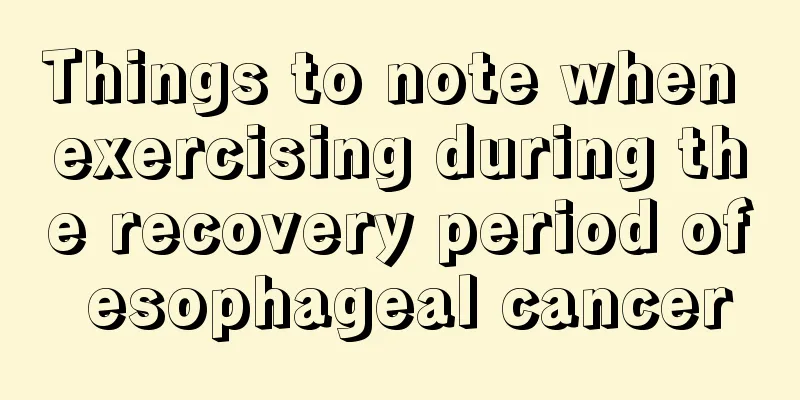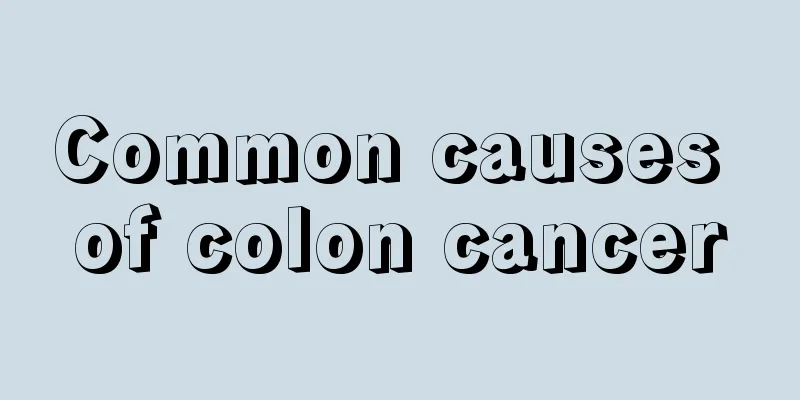Things to note when exercising during the recovery period of esophageal cancer

|
Esophageal cancer is a very common tumor disease. If patients want to recover as quickly as possible after surgery, they should insist on taking medication and do appropriate exercise. Although esophageal cancer is not an easy disease to cure, if everyone can receive timely treatment, it can effectively prolong life. 1. Respiratory function training. Thoracotomy can cause serious damage to the respiratory function of older patients with esophageal cancer. Strengthening respiratory function training while taking medication after surgery is beneficial to restoring the patient's lung function. The method is to take a deep breath with balanced and continuous force until the maximum inhalation volume is reached, and then exhale slowly and evenly. Repeat this 4 times, and then repeat it after an interval of 1 hour. The purpose is to allow the lung lobes to fully expand, increase the alveolar surface tension, increase vital capacity, and improve lung function. 2. Cough training. Helping patients master effective coughing methods can prevent lung infection and facilitate recovery. The method is to take a deep breath, hold the breath, then tighten the abdomen and cough hard; do not be afraid of pain, you can cough slowly at the beginning of the exercise, and then gradually increase the strength. In order to reduce the pain caused by coughing after surgery, you can use both hands to gently press the sides of the chest to fix it when the patient coughs. 3. Small-scale exercise. Early postoperative activities can promote blood circulation, help wound healing, and prevent deep vein thrombosis in the lower extremities. Early activities can be divided into early bed rest activities and early getting up activities. In the early stage, family members should help patients turn over and pat their backs, and take a semi-recumbent position after blood pressure stabilizes; after the condition is relatively stable, the upper limbs, hands and feet can be moved in bed, and flexion and extension exercises can be performed; gradually, they can stand by the bed, walk slowly indoors, and then go out for a walk as appropriate to prevent constipation and bedsores. Exercise after esophageal cancer surgery is an issue that every patient cannot ignore, but to ensure the treatment effect of the disease, the patient's mentality is also very critical. Esophageal cancer is not an incurable disease. Patients must first establish confidence in curing the disease and face the disease optimistically and positively. |
<<: Precautions after esophageal cancer surgery
>>: How to exercise for esophageal cancer
Recommend
How should acute severe aplastic anemia be treated?
In terms of clinical symptoms, the onset of acute...
Central disc herniation
Central disc herniation is actually a type of lum...
Detailed explanation of the causes of finger joint pain
Many friends do not care about the pain in their ...
The difference between fresh milk and pure milk
Milk is a common food on everyone’s table, and th...
Why do you fart after eating durian
Every food has different functions. White radish ...
At what age do children start learning to walk?
Parents all hope that their children will grow up...
What are the methods for treating lung cancer? The most effective treatment methods for lung cancer
At present, the treatment for lung cancer is basi...
What are the symptoms of cervical precancerous lesions? There are 4 common symptoms of cervical precancerous lesions
Cervical cancer is the most common gynecological ...
The effects and functions of eating live loaches
Loach has become a delicacy on people's table...
How to check the spleen and stomach
The spleen and stomach function has a very import...
Can fresh kelp still be eaten if it is moldy
Kelp is something we often see and eat in our dai...
What are some tips for removing the yellowing around the mouth?
To remove the yellowing around the mouth, you can...
How to cut beef tenderloin
Beef is an indispensable ingredient in life becau...
Is there a high chance of hepatitis C turning into liver cancer after being cured? Here are the best things to know about liver cancer
I believe everyone has a certain understanding of...
Is it possible for ovarian tumors to heal themselves?
With the continuous progress of medicine, ovarian...









